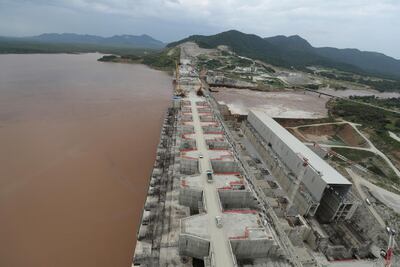Egypt has hardened its rhetoric on Ethiopia’s Nile dam in an apparent attempt to force the East African nation to make concessions to Cairo.
Construction of the Grand Renaissance Dam on the Blue Nile is due to be completed next year, when Ethiopian authorities will begin to fill a large reservoir behind it intended to hold 74 billion cubic metres of water when full.
Egypt, which depends on the Nile for 95 per cent of its water, wants Addis Ababa to stagger the filling of the reservoir over seven years to reduce the effect the dam will have on water supplies.
The repercussions of the possible reduction in Egypt’s share are Nile water is almost incalculable. Experts say millions of acres of farmland and hundreds of thousands of jobs could be lost, causing significant damage to an already struggling economy.
Egypt is, however, taking measures to lessen the blow, building water-desalination plants, recycling water used to irrigate farmland and introducing conservation techniques.
Years of negotiations between Ethiopia, Egypt and Sudan have failed to reach a breakthrough.
Water ministers from the three nations are scheduled to meet again this week in Khartoum, but there is not much hope that the meeting will produce tangible results. Ethiopia has previously refused to discuss Egypt’s proposal for a timetable for filling the reservoir, arguing that it is an infringement of its sovereignty.
Egyptian President Abdel Fattah El Sisi brought the issue to the world’s attention last week, mentioning it in his address before the United Nations General Assembly.
“While we acknowledge Ethiopia’s right to development, the water of the Nile is a question of life, a matter of existence to Egypt,” he said.
“That, in turn, places a large responsibility on the shoulders of the international community to undertake a constructive role and urge all parties to show flexibility in the pursuit of an agreement that meets with the approval of all parties.”
____________
Special report: The man-made crises facing the Middle East’s historic rivers
____________
Mr El Sisi later addressed a meeting in New York with prominent US figures. “The operation of the dam through the imposition of a de facto situation will never happen because we have no other source of water beside the Nile,” he said.
Experts have consistently ruled out military action by Cairo, saying it would be politically costly and could expose Egypt to UN sanctions.
“Egypt’s tone has been hardened and the president started internationalising the issue,” said Abbas Sharaky, a geology and water resources professor who lectures at Cairo University’s African studies college.
“Egypt has the right to defend itself and must emerge from the crisis with an agreement so that this never happens again.”
Egypt acknowledges Ethiopia’s development needs, and maintains it has accepted that the $4 billion (Dh14.6bn) project will have a negative effect on it – but it wants that effect to be minimised.
But, according to Mr Sharaky, Cairo also wants to make sure that Ethiopian blueprints for more upstream dams on the Blue Nile are not implemented without full co-ordination.
The Blue Nile accounts for about 85 per cent of the Nile waters that reach Egypt. The remaining water volume comes from the White Nile, which joins the Blue Nile near Khartoum before they flow together downstream through the deserts of northern Sudan and into Egypt.
To Ethiopia and its government, the Renaissance Dam is vital to the development of the country, a matter of national pride and is now a showpiece that matches its growing influence in a region long defined by wars, internal strife and famine.
With a similar population to Egypt, Ethiopia is keen to rise to the status traditionally enjoyed by Egypt as one of the most developed nations in Africa and, like Sudan, move away from Cairo’s sphere of influence. The dam and the development it is expected to bring, it believes, will enable Addis Ababa do that.
Like several other Nile basin nations, Ethiopia also says that Egypt has taken most of the river’s waters for granted.
Egypt's language has been reflected in its media, which called Ethiopia's tactics a "cunning game". Imad Hussein, editor of Cairo's independent Al Shorouk daily, recently wrote that Egypt's tussle with Ethiopia was a "long and complicated battle … that requires the launching of an all-out diplomatic war in which we must put to use our international contacts to convince the world of the justice of our case."






